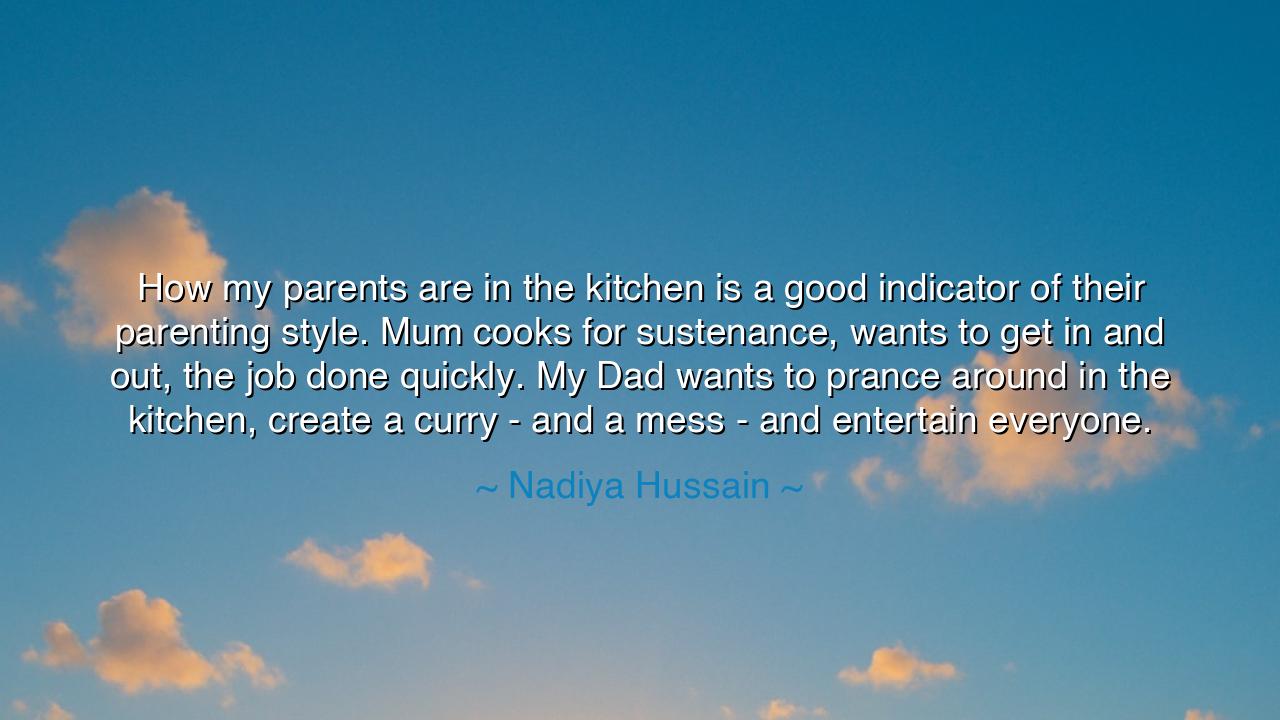
How my parents are in the kitchen is a good indicator of their
How my parents are in the kitchen is a good indicator of their parenting style. Mum cooks for sustenance, wants to get in and out, the job done quickly. My Dad wants to prance around in the kitchen, create a curry - and a mess - and entertain everyone.






Hearken, O children of generations yet unborn, and attend to the insightful words of Nadiya Hussain, whose observations weave the ordinary into the profound: “How my parents are in the kitchen is a good indicator of their parenting style. Mum cooks for sustenance, wants to get in and out, the job done quickly. My Dad wants to prance around in the kitchen, create a curry—and a mess—and entertain everyone.” In these words lies a subtle but enduring truth: that the ways of daily life, the small acts of care and expression, often reveal the character, priorities, and wisdom of those who raise us. The kitchen becomes a mirror, reflecting values, temperament, and method of nurturing.
The origin of this reflection lies in Hussain’s childhood and observations of her parents, each distinct in temperament and approach. Her mother embodies efficiency, practicality, and care focused on sustenance, while her father embodies creativity, joy, and an expansive spirit. From these contrasts, she discerns the broader truths of parenting: that one can nourish through diligence and structure, or through exploration, joy, and shared experience. Together, these approaches shape the child’s understanding of the world, of responsibility, and of the many ways love can be expressed.
The meaning of her words is profound. Parenting is not one-size-fits-all, nor is it defined solely by rules or words. It is visible in actions, in habits, in the ways care is given. A parent who moves with efficiency teaches discipline, consistency, and reliability, while one who lingers in creativity teaches joy, curiosity, and the beauty of shared endeavor. Hussain’s observation reminds us that children absorb these lessons through daily life, learning not only from words but from the spirit and method of their guardians’ engagement.
Consider the historical example of Julia Child and her daughter Camille, where the kitchen became a classroom of life. Julia’s exuberant and playful approach to cooking taught Camille not only the techniques of the culinary arts but the delight of experimentation, laughter, and shared accomplishment. The act of creating, making mistakes, and embracing the mess became a metaphor for life itself. Just as Nadiya Hussain observed, the parent’s approach to a simple task reveals the principles they embody and pass to the young.
Yet Hussain’s words also carry a subtle admonition: the diversity of parenting styles is valuable, and neither efficiency nor playfulness is inherently superior. Both contribute to the formation of character, understanding, and resilience. The child learns that life encompasses both discipline and joy, structure and creativity, duty and celebration. It is in the weaving together of these qualities that a child gains balance, perspective, and the ability to navigate the world with both skill and grace.
The lesson for future generations is luminous: observe and reflect upon the ways in which care is given, for they shape the soul as profoundly as words or instruction. The ordinary acts—the stirring of a pot, the setting of a table, the laughter shared over a meal—carry teachings that endure. Children absorb lessons of patience, creativity, consistency, and joy, not through lectures, but through witness and participation.
In practical life, one may follow Hussain’s counsel by being mindful of everyday actions and the messages they convey. Approach tasks with intention, whether in diligence or in play. Show care in small ways, and recognize that the spirit brought to each act—be it cooking, cleaning, or conversation—teaches lessons of character, love, and perseverance. Embrace both structure and creativity, for each has its place in nurturing wisdom and resilience.
Thus, O children of future ages, carry this teaching as both lamp and mirror: the ways in which guardians engage with daily life, even in the humble kitchen, reveal the essence of parenting and nurture. Witness, learn, and embody these lessons with intention and grace. In doing so, the ordinary becomes extraordinary, the daily becomes sacred, and the legacy of care, creativity, and balance endures across generations, nourishing both body and spirit alike.






AAdministratorAdministrator
Welcome, honored guests. Please leave a comment, we will respond soon